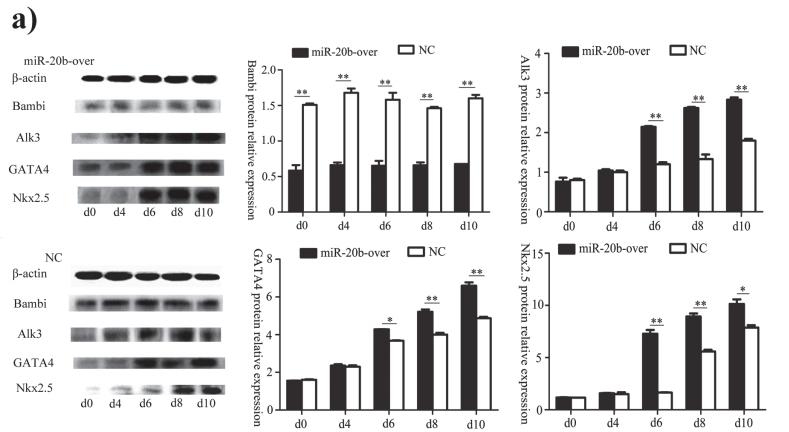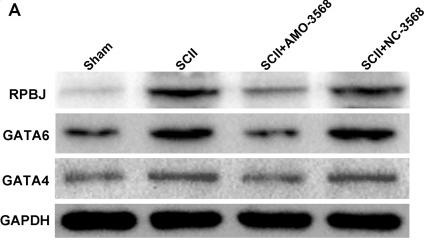GATA4 Antibody - #AF5245
| Product: | GATA4 Antibody |
| Catalog: | AF5245 |
| Description: | Rabbit polyclonal antibody to GATA4 |
| Application: | WB IHC IF/ICC |
| Cited expt.: | WB, IHC |
| Reactivity: | Human, Mouse, Rat |
| Prediction: | Pig, Zebrafish, Bovine, Horse, Sheep, Rabbit, Dog, Chicken, Xenopus |
| Mol.Wt.: | 46 kDa; 45kD(Calculated). |
| Uniprot: | P43694 |
| RRID: | AB_2837731 |
Related Downloads
Protocols
Product Info
*The optimal dilutions should be determined by the end user. For optimal experimental results, antibody reuse is not recommended.
*Tips:
WB: For western blot detection of denatured protein samples. IHC: For immunohistochemical detection of paraffin sections (IHC-p) or frozen sections (IHC-f) of tissue samples. IF/ICC: For immunofluorescence detection of cell samples. ELISA(peptide): For ELISA detection of antigenic peptide.
Cite Format: Affinity Biosciences Cat# AF5245, RRID:AB_2837731.
Fold/Unfold
ASD2; GATA 4; GATA binding protein 4; GATA-binding factor 4; gata4; GATA4_HUMAN; MGC126629; Transcription factor GATA 4; Transcription factor GATA-4; Transcription factor GATA4; VSD1;
Immunogens
A synthesized peptide derived from human GATA4, corresponding to a region within the internal amino acids.
- P43694 GATA4_HUMAN:
- Protein BLAST With
- NCBI/
- ExPASy/
- Uniprot
MYQSLAMAANHGPPPGAYEAGGPGAFMHGAGAASSPVYVPTPRVPSSVLGLSYLQGGGAGSASGGASGGSSGGAASGAGPGTQQGSPGWSQAGADGAAYTPPPVSPRFSFPGTTGSLAAAAAAAAAREAAAYSSGGGAAGAGLAGREQYGRAGFAGSYSSPYPAYMADVGASWAAAAAASAGPFDSPVLHSLPGRANPAARHPNLDMFDDFSEGRECVNCGAMSTPLWRRDGTGHYLCNACGLYHKMNGINRPLIKPQRRLSASRRVGLSCANCQTTTTTLWRRNAEGEPVCNACGLYMKLHGVPRPLAMRKEGIQTRKRKPKNLNKSKTPAAPSGSESLPPASGASSNSSNATTSSSEEMRPIKTEPGLSSHYGHSSSVSQTFSVSAMSGHGPSIHPVLSALKLSPQGYASPVSQSPQTSSKQDSWNSLVLADSHGDIITA
Predictions
Score>80(red) has high confidence and is suggested to be used for WB detection. *The prediction model is mainly based on the alignment of immunogen sequences, the results are for reference only, not as the basis of quality assurance.
High(score>80) Medium(80>score>50) Low(score<50) No confidence
Research Backgrounds
Transcriptional activator that binds to the consensus sequence 5'-AGATAG-3' and plays a key role in cardiac development and function. In cooperation with TBX5, it binds to cardiac super-enhancers and promotes cardiomyocyte gene expression, while it downregulates endocardial and endothelial gene expression. Involved in bone morphogenetic protein (BMP)-mediated induction of cardiac-specific gene expression. Binds to BMP response element (BMPRE) DNA sequences within cardiac activating regions (By similarity). Acts as a transcriptional activator of ANF in cooperation with NKX2-5 (By similarity). Promotes cardiac myocyte enlargement. Required during testicular development. May play a role in sphingolipid signaling by regulating the expression of sphingosine-1-phosphate degrading enzyme, spingosine-1-phosphate lyase.
Methylation at Lys-300 attenuates transcriptional activity.
Nucleus.
Research Fields
· Cellular Processes > Cell growth and death > Cellular senescence. (View pathway)
· Cellular Processes > Cellular community - eukaryotes > Tight junction. (View pathway)
· Environmental Information Processing > Signal transduction > cGMP-PKG signaling pathway. (View pathway)
· Organismal Systems > Endocrine system > Thyroid hormone signaling pathway. (View pathway)
References
Application: WB Species: Mouse Sample: NRCMs
Application: WB Species: Sample: miR-20b cells
Application: WB Species: Rat Sample: spinal cord tissues
Application: IHC Species: Cat Sample:
Restrictive clause
Affinity Biosciences tests all products strictly. Citations are provided as a resource for additional applications that have not been validated by Affinity Biosciences. Please choose the appropriate format for each application and consult Materials and Methods sections for additional details about the use of any product in these publications.
For Research Use Only.
Not for use in diagnostic or therapeutic procedures. Not for resale. Not for distribution without written consent. Affinity Biosciences will not be held responsible for patent infringement or other violations that may occur with the use of our products. Affinity Biosciences, Affinity Biosciences Logo and all other trademarks are the property of Affinity Biosciences LTD.







